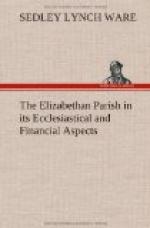Finally, in the parish church assembled vestries for the holding of accounts, the making of rates and the election of officers. Overseers of the poor held their monthly meetings here. Occasionally the neighboring justices of the peace met here to take the overseers’ accounts or to transact other business;[14] and in the church also might be held coroners’ inquests over dead bodies.[15] Last, but not least in importance, in the churches of the market towns the archdeacon made his visitations and held his court; and on these occasions the sacred edifice rang with the unseemly squabbles of the proctors, the accusations of the wardens and sidemen or of the apparitor, and the recriminations of the accused—in short, the church was turned for the time being into a moral police court, where all the parish scandal was carefully gone over and ventilated.[16]
The ecclesiastical courts carried on their judicial administration of the parish largely, of course, through the medium of the officers of the parish. These were the churchwardens, the sidemen and the incumbent, whether rector, vicar or curate.[17]
First in importance were the churchwardens. Though legislation throughout the time of Elizabeth was ever adding to their functions duties purely civil in their nature, and though they themselves were more and more subjected to the control of the justices of the peace, nevertheless it is true to say that to the end of the reign the office of churchwarden is one mainly appertaining to the jurisdiction and supervision of the courts Christian.
The doctrine of the courts that churchwardens were merely civil officers belongs to a later period.[18]
After a churchwarden had been chosen or elected, he took the oath of office before the archdeacon. In this he swore to observe the Queen’s and the bishop’s injunctions, and to cause others to observe them; to present violators of the same to the sworn men (or sidemen), or to the ordinary’s chancellor or official, or to the Queen’s high commissioners; finally, he swore to yield up a faithful accounting to the parish of all sums that had passed through his hands during his term of office.[19]
Before each visitation day, as has been said, the archdeacon’s or the bishop’s summoner went to each parish and gave warning that a court would be held in such and such a church on such and such a day. Pending that day wardens and sidemen drew up their bills of presentment. These bills were definite answers to a series of articles of inquiry founded on the diocesan’s injunctions, themselves based on the Queen’s Injunctions of 1559 and on the Canons.[20] Failure to present offences was promptly punished by the judge.[21] Failure to attend court when duly warned was no less promptly followed by excommunication, and then it was an expensive matter for the wardens to get out of the official’s book again.[22] But of fees and fines more hereafter.




